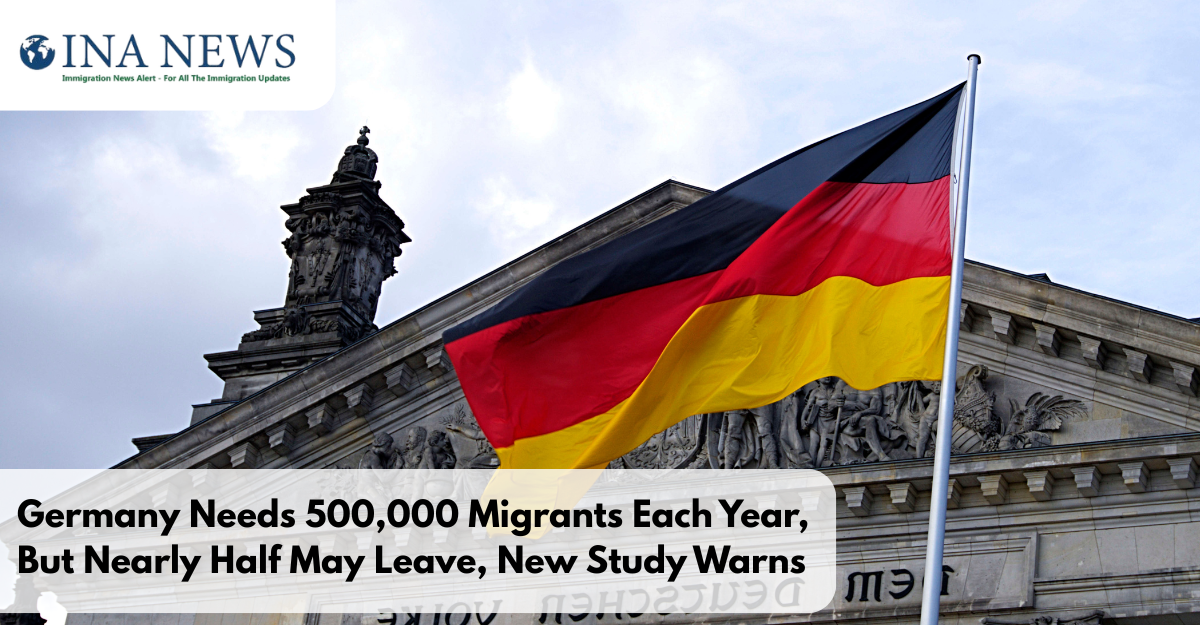Germany’s urgent demand for skilled workers continues to rise, with an estimated need for 500,000 immigrants annually to keep its economy running. But a new study from the Institute for Employment Research (IAB) reveals a growing concern: 43% of immigrants in Germany are either planning to leave or unsure about staying long-term, posing a critical challenge to the country’s retention strategy.
Only 57% Want to Stay for Good
The IAB survey, conducted between December 2024 and April 2025, included 50,000 foreign-born residents between the ages of 18 and 65. It excluded asylum seekers without formal residence status. According to the findings:
- 57% (approx. 5.7 million) plan to stay permanently
- 12% (around 1.2 million) see their stay as temporary
- 30% (nearly 3 million) are undecided
Even more striking, 2.6 million migrants reported they had considered leaving in the past year, and 300,000 already have concrete emigration plans—split evenly between return migration and onward relocation.
Why Are Skilled Immigrants Leaving?
Contrary to assumptions, it is highly educated and economically successful migrants who are most likely to leave. IAB researcher Katia Gallegos Torres noted that professionals in IT, finance, business services, and even healthcare are reconsidering Germany as a long-term destination.
“These are the very people Germany desperately needs to fill growing labour shortages,” said Torres. Up to 39% of skilled workers in critical sectors expressed intentions to emigrate, especially those with postgraduate degrees and higher incomes.
The top destinations for onward migration include Switzerland, the United States, and Spain, while many others are considering returning to home countries like Poland and Romania.
What’s Driving This Exodus?
The study cites several key push factors:
- Family ties leading to return migration
- Better salaries and job options abroad
- Dissatisfaction with bureaucracy and high taxes
- Discrimination and social exclusion
Nearly two-thirds of immigrants reported experiencing discrimination—whether at work, in housing, public spaces, or dealing with authorities. Additionally, a third of respondents felt “not welcome” or only slightly welcome, according to the IAB.
Political Atmosphere Fuelling Uncertainty
The study also highlighted the growing political chill toward migration. In the 2025 federal election, the far-right AfD became the second-largest party, while the CDU-led government began rolling back pro-immigration reforms, tightening border controls and pausing plans to ease naturalisation rules.
Yuliya Kosyakova, lead researcher at IAB, noted that this atmosphere affects not just policy but also migrant sentiment:
“Debates around migration are influencing how welcomed immigrants feel—and many are responding by planning to leave.”
Labour Gaps Remain Urgent
Germany’s need for migrants is clear. By late 2024, the country had 1.4 million job vacancies, from bakers and bus drivers to software developers and nurses. One in five nurses is now foreign-born. In May 2025, German Ambassador to India Dr Philipp Ackermann confirmed the target: “We need at least 500,000 skilled workers every year.”
Solutions: Policy and Social Reform Needed
To improve retention, the IAB recommends:
- Streamlining foreign credential recognition
- Reducing bureaucratic delays
- Digitising immigration processes
- Providing tax incentives for skilled workers
The CDU has also proposed mandatory five-year service periods for foreign-trained doctors or repayment of educational costs, though this remains controversial.
Who Took Part in the Study?
Respondents hailed from 188 countries. The most represented nationalities included:
- Ukraine (10.5%)
- Turkey (6.1%)
- India (4.4%)
- United States (4.3%)
- Poland (4.2%)
Germany’s real immigration challenge in 2025 isn’t just attracting talent, it’s keeping it. As skilled professionals weigh their options, the country must urgently work on both practical reforms and social acceptance to convince migrants that Germany is truly worth calling home.



